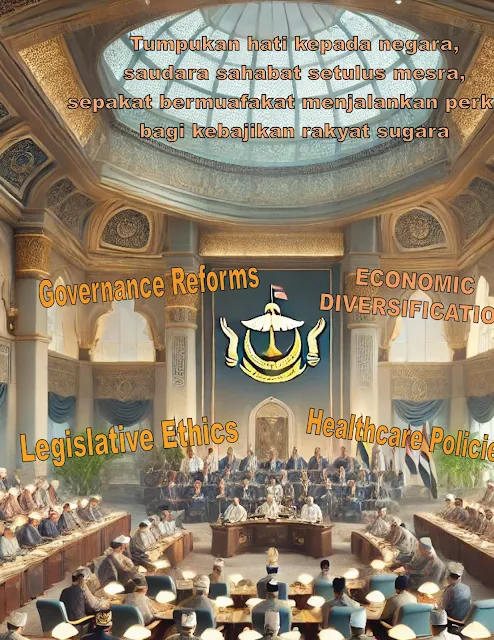By Malai Hassan Othman
BANDAR SERI BEGAWAN, 28 FEBRUARY 2025: The 21st Legislative Council (LegCo) session (Day 2) continued yesterday with intense deliberations over His Majesty’s titah, with members responding to key national concerns such as governance reforms, economic diversification, healthcare policies, and legislative ethics.
While discussions reflected a commitment to progress, the session also exposed implementation challenges and lingering policy contradictions.
Governance Reform: More Sessions, Higher Expectations
One of the most significant announcements was the decision to increase LegCo sittings to twice a year.
The intention is to enhance policy scrutiny and accelerate government decision-making.
Members expressed optimism that this move will ensure more rigorous debate and oversight.
However, concerns were raised regarding the ability of previous legislative sessions to address national priorities effectively.
Some members highlighted the importance of evaluating past projects to determine their relevance and effectiveness moving forward.
They noted that structured and open discussions with grassroots stakeholders were emphasised to ensure policies translate into tangible benefits.
Members debated the government’s plan for enhancing legislative professionalism, particularly the introduction of a Legislative Code of Ethics to ensure transparency, professionalism, and accountability.
Economic Diversification: Progress, But Challenges Remain
The government reported a 4.3% growth in the non-oil sector, signalling progress in efforts to diversify Brunei’s economy.
The petrochemical industry, in particular, has emerged as a key contributor, with exports expanding to new markets such as Chile, Mozambique, Colombia, Peru, and Mexico.
However, some members cautioned against overstating progress, emphasising that Brunei remains heavily dependent on oil and gas revenue.
There was consensus that economic transformation requires greater investment in technology, upskilling of the workforce, and fostering innovation-driven industries.
Members also highlighted the need to broaden diversification beyond petrochemicals, calling for more structured investments in agriculture, tourism, and logistics sectors.
Healthcare for Stateless Residents: A Bold Move with Complex Implications
His Majesty’s directive to extend free healthcare to stateless permanent residents was widely acknowledged as a compassionate and progressive policy.
Members noted the humanitarian aspect of ensuring access to medical services for those who have lived in Brunei for generations.
At the same time, concerns were raised over the long-term financial sustainability of this expansion.
Questions emerged about whether the healthcare system is equipped to handle the increased demand and what measures would be in place to manage associated costs without burdening national resources.
Artificial Intelligence and Workforce Readiness
His Majesty’s call for embracing Artificial Intelligence (AI) and digital transformation was met with enthusiasm, with members acknowledging the potential of AI to drive economic growth.
However, members also highlighted a critical gap in workforce preparedness.
There were concerns about whether Brunei’s education system and training programs are adequately equipping local talent to take advantage of emerging AI-driven industries.
One legislator called for greater AI literacy and investment in human capital development to ensure Bruneians can participate meaningfully in the tech economy.
Legislative Code of Ethics: Strengthening Accountability
The proposal for a Legislative Code of Ethics was another key topic.
Members generally supported the initiative, recognizing its importance in ensuring transparency and professionalism among lawmakers.
However, discussions also revealed concerns about how the Code would be enforced.
Some members emphasised that ethics reforms must go beyond symbolic measures and should include concrete mechanisms for accountability.
Conclusion: A Session of Aspirations and Tough Questions
As the second day of the LegCo session concluded, members acknowledged the ambitious direction outlined in His Majesty’s titah.
However, the debates also exposed critical questions about execution, sustainability, and the effectiveness of governance reforms.
In a Nutshell: Key Takeaways from Yesterday’s Debate:
- Economic diversification showing progress, but oil dependency remains a concern.
- Calls for expansion beyond petrochemicals, with investments needed in agriculture, tourism, and logistics.
- Free healthcare expanded to stateless residents, with sustainability challenges.
- AI and digital transformation are emphasized, but workforce readiness is questioned.
- Legislative Code of Ethics was introduced, with concerns over enforcement mechanisms.
- LegCo sittings doubled, with expectations of greater legislative impact.
Brunei’s policymakers have set ambitious goals, but as discussions underscored, policy success is determined by effective execution and tangible improvements in citizens' lives. (MHO/02/2025)


.jpeg)





